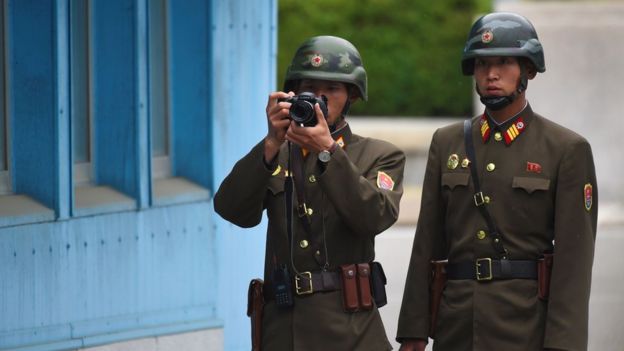Capricorn
Regular Member
- Joined
- Apr 18, 2009
- Messages
- 53
- Likes
- 35
Pence: US era of strategic patience with North Korea over

US Vice-President Mike Pence has said his country's "era of strategic patience" with North Korea is over.
Mr Pence made the remarks at the demilitarised zone (DMZ), the area dividing the two Koreas, during a visit to South Korea to reaffirm ties.
His visit comes amid escalated tensions on the peninsula, with heated rhetoric from both North Korea and the US.
He arrived in Seoul on Sunday hours after North Korea carried out a failed missile launch.
On Monday, the US and South Korea launched a joint air force military exercise to ensure readiness against North Korea, according to South Korean media.
Mr Pence, whose father served in the Korean War, was speaking on Monday at the truce village of Panmunjom, where the war's armistice was signed.
He told reporters: "There was a period of strategic patience, but the era of strategic patience is over."
The US wants to achieve security on the peninsula "through peaceable means, through negotiations", he said, "but all options are on the table".

Image copyrightAFP/GETTY IMAGES
Image captionNorth Korean guards on the border watched as Mr Pence toured the village, with one seen photographing his visit
Mr Pence also reiterated the US commitment to South Korea, saying it was an "iron-clad alliance", and that North Korea "should not mistake the resolve" of the US to stand with its allies.
Earlier in the day he visited Camp Bonifas, a United Nations military compound near the DMZ, and on Sunday he met with US military families stationed in South Korea.
Mike Pence, who is set to meet the acting president of South Korea later, will visit four nations on his 10-day Asia tour.
He has denounced North Korea's ballistic missile test on Sunday as a "provocation".
Also on Sunday, Lt Gen HR McMaster, the US top security adviser, said his country was working on a "range of options" with China, the first confirmation the two countries were co-operating to find a solution to the North Korean issue.
China, historically Pyongyang's sole major ally, has reiterated its call for North Korea to stop all tests, and has also called for a peaceful solution.
US President Donald Trump, who stated last week that the US and its allies may "deal with" Pyongyang if China did not, said on Sunday that Beijing was "working with us on the North Korean problem".
Besides Sunday's launch, North Korea has held a series of large-scale events in the past week including a massive celebration and military parade on Saturday.

http://www.bbc.com/news/world-asia-39618573

US Vice-President Mike Pence has said his country's "era of strategic patience" with North Korea is over.
Mr Pence made the remarks at the demilitarised zone (DMZ), the area dividing the two Koreas, during a visit to South Korea to reaffirm ties.
His visit comes amid escalated tensions on the peninsula, with heated rhetoric from both North Korea and the US.
He arrived in Seoul on Sunday hours after North Korea carried out a failed missile launch.
On Monday, the US and South Korea launched a joint air force military exercise to ensure readiness against North Korea, according to South Korean media.
Mr Pence, whose father served in the Korean War, was speaking on Monday at the truce village of Panmunjom, where the war's armistice was signed.
He told reporters: "There was a period of strategic patience, but the era of strategic patience is over."
The US wants to achieve security on the peninsula "through peaceable means, through negotiations", he said, "but all options are on the table".

Image copyrightAFP/GETTY IMAGES
Image captionNorth Korean guards on the border watched as Mr Pence toured the village, with one seen photographing his visit
Mr Pence also reiterated the US commitment to South Korea, saying it was an "iron-clad alliance", and that North Korea "should not mistake the resolve" of the US to stand with its allies.
Earlier in the day he visited Camp Bonifas, a United Nations military compound near the DMZ, and on Sunday he met with US military families stationed in South Korea.
Mike Pence, who is set to meet the acting president of South Korea later, will visit four nations on his 10-day Asia tour.
He has denounced North Korea's ballistic missile test on Sunday as a "provocation".
Also on Sunday, Lt Gen HR McMaster, the US top security adviser, said his country was working on a "range of options" with China, the first confirmation the two countries were co-operating to find a solution to the North Korean issue.
China, historically Pyongyang's sole major ally, has reiterated its call for North Korea to stop all tests, and has also called for a peaceful solution.
US President Donald Trump, who stated last week that the US and its allies may "deal with" Pyongyang if China did not, said on Sunday that Beijing was "working with us on the North Korean problem".
Besides Sunday's launch, North Korea has held a series of large-scale events in the past week including a massive celebration and military parade on Saturday.

http://www.bbc.com/news/world-asia-39618573






 video
video








